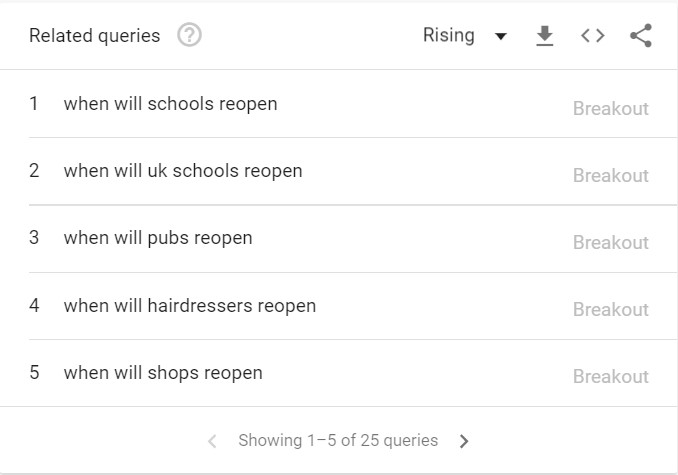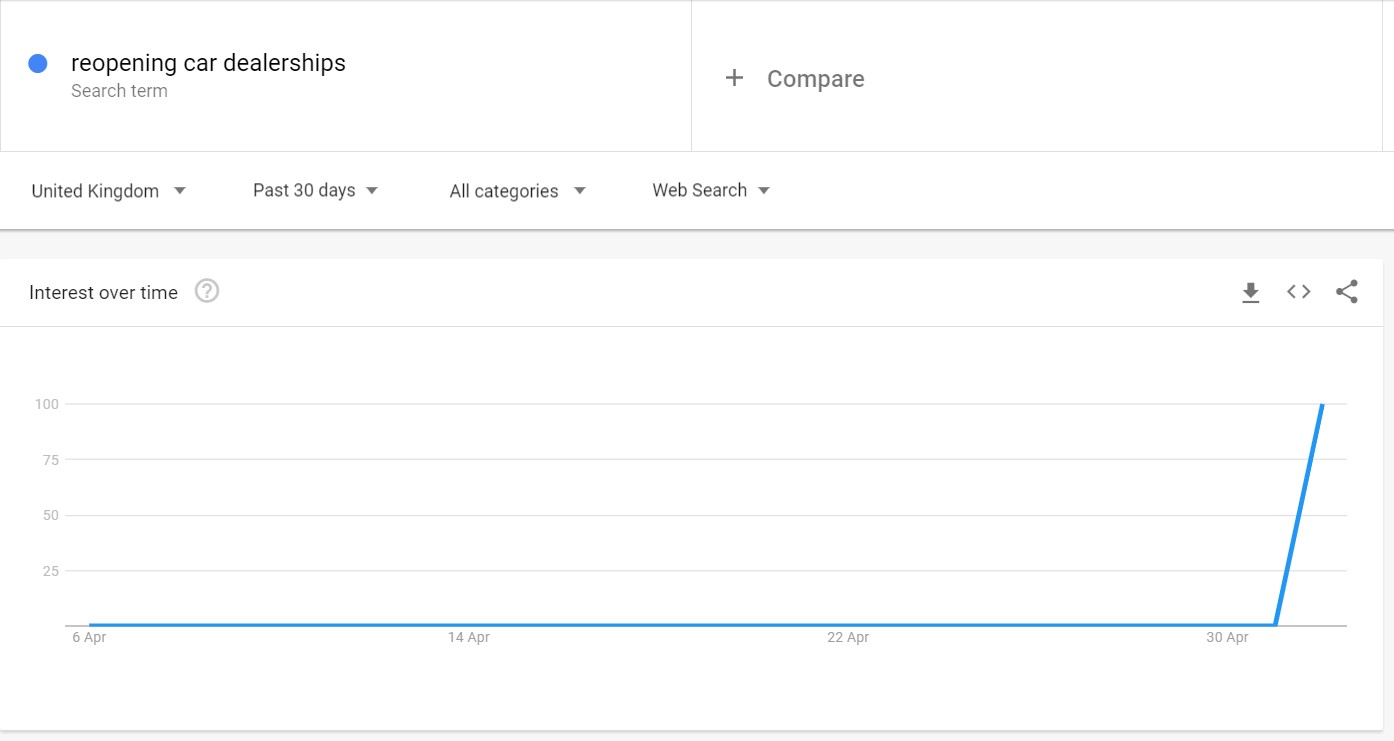12 May 3 New ‘Must-Know’ Trends for Marketing via @LWilson1980
Search trends are changing rapidly.
For data-driven marketing experts, now is the time to:
- Adapt campaigns.
- Maximize new, growing, and changing opportunities.
Anyone immersed in data will know that search behavior and demand are changing daily, and the time to take action is now.
Let’s explore three of the latest search trends emerging out of the Coronavirus climate, along with practical steps that can be taken to make the most of them for your business.
The focus has been on the U.K. target audience.
However, in many cases, the trends will be apparent (with close match term variations) for other countries too.
For added reading on this topic, I also recently covered some of the broader crisis marketing actions which may be useful to review.
1. ‘When Will [Insert Service] Reopen’
This search trend demonstrates the need for people to resume many of their normal lifestyle activities and consumer choices.
You can view this generic trend below, plus there is an example of this in practice for ‘car dealerships’ and the topic of ‘reopening’, so you can see how this is easily adapted for reviewing on any industry.
‘When Will Reopen’ Insights
Looking at the past 12 months’ search demand, as you would expect, this trend previously did not exist to any visible level.
All services had a standard level of availability that people were aware of and users knew how to discover the information directly, without the need to search explicitly for this type of informational intent.
When considering this emerging trend over a 90-day duration, you can see more clearly how the COVID-19 scenario has begun to move from initial reactive and essentials mindsets for people toward a proactive, forward-thinking, and “return to a new normal” state of mind.
Here, you can see the breakout patterns related to this search intent and how this can be applied (and reviewed) for any industry:


Applying This Trend to Car Dealerships
Practical Actions
Practical considerations for implementing actions related to emerging trends like this include:
- Ensuring your Google My Business (GMB), Bing Places, and related within SERP features are updated with all the correct business opening times and associated details.
- Updating your contact page and related contact forms, and call to actions to ensure they reflect the latest situation.
- Revising home page text and any pop-up content, banners, or prominent on-page elements to affirm the correct information.
- Creating new content (news, blog posts) for your website to explicitly target this topical intent.
- Placing comments on external forums, social media channels, and relevant community sites to keep your active audience up to date.
- Writing and distributing PR content for external media outlets and local audience websites to maximize brand visibility and pre-booking of services.
- Boosting the value of current service pages to enable people to future book services.
- Providing online help, support and service selling though areas such as chatbots.
2. Online Buyer Behavior Changes
People have changed how they buy online, the volume they purchase, and numerous other behavioral items.
While some of this change may be attributed to shorter-term attitudes (which offer marketing experts immediate financial opportunities), others will likely remain for the longer term.
Econsultancy noted:
“Many of our day-to-day habits have changed since the start of the coronavirus pandemic, but the way consumers shop for food and groceries has undoubtedly been one of the biggest shifts.”
They went on to state:
“Mintel forecasts a 33% bump for online grocery sales in 2020 (and notes that 36% of UK consumers say they are increasing the amount of online shopping they do), while GlobalData predicts a 25.5% increase this year.”
Practical Actions
There are many online buyer changes that will be evident both in industry data like that mentioned previously and within your own internal data sets.
Users will be digesting different and new content before making a buying decision. (For example, reading delivery delays and terms and conditions, plus “safe buying” details.)
It is important that this content is present on your website and easily accessible, as it will pose a new barrier to purchase otherwise.
At present, there are frequent insights into people increasing the volume and basket size of online ordering, as well as them beginning to delay bigger single item purchases, plus non-essential buying.
But you should look within your own data to see if this delay mentality is present for your audience.
This is changing daily, so you do not want to assume anything – let the data decide.
As a business, you will also want to be first to act as people do start to want to buy luxury goods and services again.
To do this you need to ensure content messaging, tone, and pitch is adjusted towards helping reduce the time to purchase and minimize any perceived need to delay.
It is important to identify these and related trends, decide:
- Which requires instant action taking (those that are short term trends).
- Those that are expected to continue for the medium to longer-term (such as increases in basket values, more people choosing to buy online, and more).
3. Time to Do Intent Targeting
“Time to do” intent is simply targeting all of the planned and new activity and user intent that is placed on completing things based on the unexpected time at home as well as remote working.
A few examples of this in action are listed next, but these forms of practical intent targeting are present in lots of varied ways.
My intention is that the following will help stem your own investigations.
Practical Actions
People are actively seeking to:
- Complete home improvements.
- Bring forward planned DIY.
- Entertain themselves and their families while they are at home more frequently than expected.
This presents the much-unexpected products, services, and solution opportunities for companies to bring themselves in front of new audiences.
As detailed in this report from Think with Google:
“However, while immediate needs are stabilising, people are continuing to look for new ways to pass their time. Whether it’s preparing their outdoors space for the summer, exploring pet adoptions, spending time with friends and family online, or looking to DIY their self-care, beauty, baking, and home decor, people are adapting and being creative with how they spend their time.”
This change in peoples free time has led to search changes to explore such as:
- “Donate to” and related charitable donation intent and increase in search demand in the UK and other countries.
- Business loans/support loans increases in search intent spanning many countries.
- Online learning, e-learning, and the search demand to train and improve skill sets which is present in most countries.
The above are simply several examples where many exist.
Conclusion
All companies have an opportunity to take action now and make the most out of daily, weekly, and longer-term trends that are emerging.
Hopefully, three new trends and practical examples will help you progress your own data diving and insight discovery for your industry and specific business.
More Resources:
- Google COVID-19 Marketing Strategy Playbook
- Why It’s Time to Plan Your Digital COVID-19 Recovery & 3 Ways to Do It
- 12 Ways to Adapt Your Marketing in Times of Forced Isolation
Image Credits
All screenshots taken by author, May 2020



Sorry, the comment form is closed at this time.